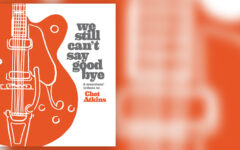
Founded by Joe Macheret (vocals, guitar, big head banjo, fiddle, percussion), Joe’s Truck Stop is a decidedly homegrown affair. Yonderlings, the third album by the Cincinnati-based band — which also includes musicians Andrew McPheters (harmony vocals, 5-string banjo), June Youngblood (harmony vocals, upright bass), Stephen “Tebbs” Karney (dobro, pedal steel guitar), Scott Risner (harmony vocals, mandolin), John K Victor (harmonica), Joe Wunderle (harmony vocals, harmonica, piano), Sean Geil (banjo), and Chris Novy (drums) — was recorded in a mobile studio located inside a 50 year old barn. To ensure that ambience, the project was overseen by David Mayfield, known for his work with Cadillac Sky and open his own music. Not surprisingly then, the resulting sound reflects those rustic environs, thanks to songs that are frayed around the edges, yet still flush with both an honesty and emotion that reflects the album’s rural origins.
That’s apparent in the unhurried attitude that pervades the album overall, from the easy drift of the otherwise unassuming Gas Station Sushi, and the gentle sway which steers Midnight on the Ohio and Wishin’ on A Star, to the rambling and slightly unhinged instrumentals Grease Fire and Pappy Hondo, and the sprightly sounds of Winter Waltz.
Still and Silence takes that nonchalant approach several steps further. “I’ve been living on the road, this vehicle’s my home,” Macheret sings. “So put out your smoke and kick off your shoes.”
So too, Waltz for Lucille shares in that casual caress, a reflection of an attitude that’s devoid of pretense, and yet intended for enjoyment even in the most intimate environs.
In that regard, Yonderings reflects a singular style spun from down-home celebration — earnest, engaging and rooted in actual folk tradition. The musicians blend skill with subtlety, negating the flash while still retaining a flourish and finesse. Clarity and confidence shine through, without cause to grandstand or any attempt at outshining one another.
Ultimately, Yonderlings can’t be considered groundbreaking, or anything that even attempts to breach bluegrass boundaries. It is, however, an engaging album that evokes the spirt of a seminal sound. When, on the closing track, Thank You, Macheret expresses his gratitude for the joy he’s been blessed with, the emotions radiating as a result might just prompt listeners to pause and reflect on some good fortune of their own.







